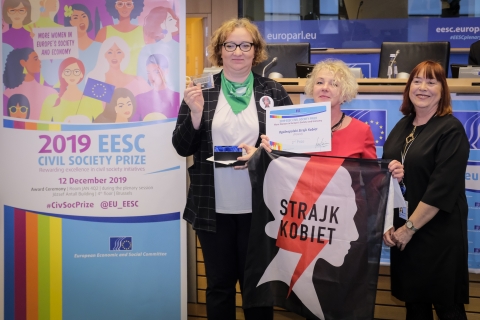European Economic
and Social Committee
The Polish Women's Strike: getting small-town women into the fight for women's rights
The Polish Women's Strike (PWS), winner of the second prize, is a grassroots movement that arose in Poland in 2016 as a reaction to the government's attempt to scrap women's abortion rights. Since then the movement has grown across the country and led a number of actions that have seen the mass participation of women from small and medium-sized Polish cities. PWS's Marta Lempart shares her thoughts on the vital importance of this movement in today's Poland.
EESC info: What does this prize mean for you and your organisation?
Marta Lempart: We feel visible. Women who are doing the hardest activist work, where there are no TV cameras, no big media, no artistic photographs, no recognition apart from the horrible cyber and non-cyber hate, the ordinary women - teachers, saleswomen, mothers, nurses, chefs and drivers, who are the change they want to see - in small and middle sized cities of Poland, are finally visible and appreciated - their sacrifice, their courage, their ideas, efforts and successes. The point of recognition in international herstory and history is for those who do not demand fame - but deserve to be seen, heard, and supported in spite of coming from a non-capital city, a non-big city post code.
It also means that the time of big-city feminism driven by establishment, privileged and academic women is ending; that now the ordinary women who have been silenced, ignored and looked down as "not good/educated/eloquent/prepared/accepted enough” to be feminists, women who put themselves on the line on a daily basis, are taking the lead, because they know best that this is a life or death fight.
What advice would you give to other organisations in terms of achieving results with such activities and programmes?
1. Get rid of the management board - create a helpdesk to coordinate and serve projects. Never, ever create and force projects from the top down - get rid of the up-and-down, create a powerful network of support. Understand that where there is 100% responsibility for the outcome, there has to be 100% decision-making power. Finance and support in any way you can anything that even only partially fits in your organisational vision - don't look for and don't force 100% matches in ideas, views and actions. Believe in what people say, how they feel and what they do.
2. Respect and encourage local activism as the focus point in whatever you do, actively fight media ignorance and arrogance towards local activism, which is usually invisible and ignored by national media outlets. Stop organising your meetings, workshops and conference in the capital city of your country.
3. Speak ordinary language.
4. Acknowledge your personal privilege and think of it for 5 minutes in the morning every day. Then use it to support people in what they do. Every day support at least one person you disagree with in terms of strategies, methods, or actions. Make sure the voice of the minority in your organisation, the voices of people forever abstaining, are heard. People can’t be forced to walk even the most reasonable and effective path - they need freedom to choose and walk their own way. That's how we all get there.
5. Be kind. Let it go.
How will you use this specific funding to provide further help in the community?
The funding will be used to actively prevent and fight activist burnout (anti-burnout fund). Most of the women in PWS are under state and social pressure (police investigations, prosecutions), many are harassed and cyberbullied, have work problems or problems with keeping their businesses afloat, and their children and families are also impacted. The pressure and the amount of engagement takes its toll on their mental health and general state of health.
Part of the fund will also be used to go back to PWS's roots. We are planning to contact all the initial organisers of the first strike who are no longer engaged in the PWS for various reasons - either because of their personal situation, or because they have joined other organisations, or have had personal conflicts - and organise a national get-together on the strike's 4th anniversary (3 October 2020).
Poland has a long history of feminist activism, and was one of the first nations in Europe to enact women's suffrage. However, Poland is also influenced by conservative views. Against this background, what does this prize mean to you?
It's great support for the first line of the fight and resistance against rightwing populism and religious fanatics - because it's women who are actively fighting the heavily sponsored, internationally organised wave of anti-woman, anti-human "New World Order" agenda that governments and international institutions seem to have no idea how to deal with. Poland was a training field for religious extremists in 2016, with the idea of a total ban on abortion. They lost that fight, and that is a fact. They expected very little or no resistance, but women have been fighting back with a struggle that is real, day in day out.
